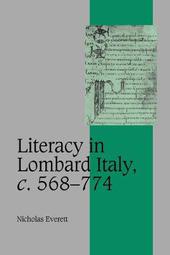
|
Literacy in Lombard Italy, c.568-774
Paperback / softback
Main Details
| Title |
Literacy in Lombard Italy, c.568-774
|
| Authors and Contributors |
By (author) Nicholas Everett
|
| Series | Cambridge Studies in Medieval Life and Thought: Fourth Series |
|---|
| Physical Properties |
| Format:Paperback / softback | | Pages:402 | | Dimensions(mm): Height 229,Width 152 |
|
| Category/Genre | Literacy
History of writing |
|---|
| ISBN/Barcode |
9780521174107
|
| Classifications | Dewey:302.2244094509021 |
|---|
| Audience | | Professional & Vocational | |
|---|
| Illustrations |
Worked examples or Exercises
|
|
Publishing Details |
| Publisher |
Cambridge University Press
|
| Imprint |
Cambridge University Press
|
| Publication Date |
3 March 2011 |
| Publication Country |
United Kingdom
|
Description
Italy had long experienced literacy under Roman rule, but what happened to literacy in Italy under the rule of a barbarian people? This book examines the evidence for the use of literacy in Lombard Italy c. 568-774, a period usually considered as the darkest of the Dark Ages in Italy due to the poor survival of written evidence and the reputation of the Lombards as the fiercest of barbarian hordes ever to invade Italy. A careful examination of the evidence, however, reveals quite a different story. Originally published in 2003, this study considers the different types of evidence in turn and offers a re-examination of the nature of Lombard settlement in Italy and the question of their cultural identity. Far from constituting a Dark Age in the history of literacy, Lombard Italy possessed a relatively sophisticated written culture prior to the so-called Carolingian Renaissance of the ninth century.
ReviewsReview of the hardback: 'In its exposition, he [Everett] has brought together in a systematic way for the first time a diverse and comprehensive array of evidence surrounding the use of writing in the Lombard realms. The study is well grounded in wide reading, both in the primary sources and in the secondary literature. Everett's style is lucid and lively, and the chapter introductions and conclusions are excellent, preventing the copious information presented in the book from overwhelming the reader. ... Nicholas Everett has produced a lively and engaging study of this important topic. His book represents a solid contribution to the scholarship surrounding the uses of writing in the early Middle Ages, which will doubtless prove stimulating to students of literacy, early medieval Italy, and the transformation of late Roman practices and institutions.' Early Medieval Europe
|